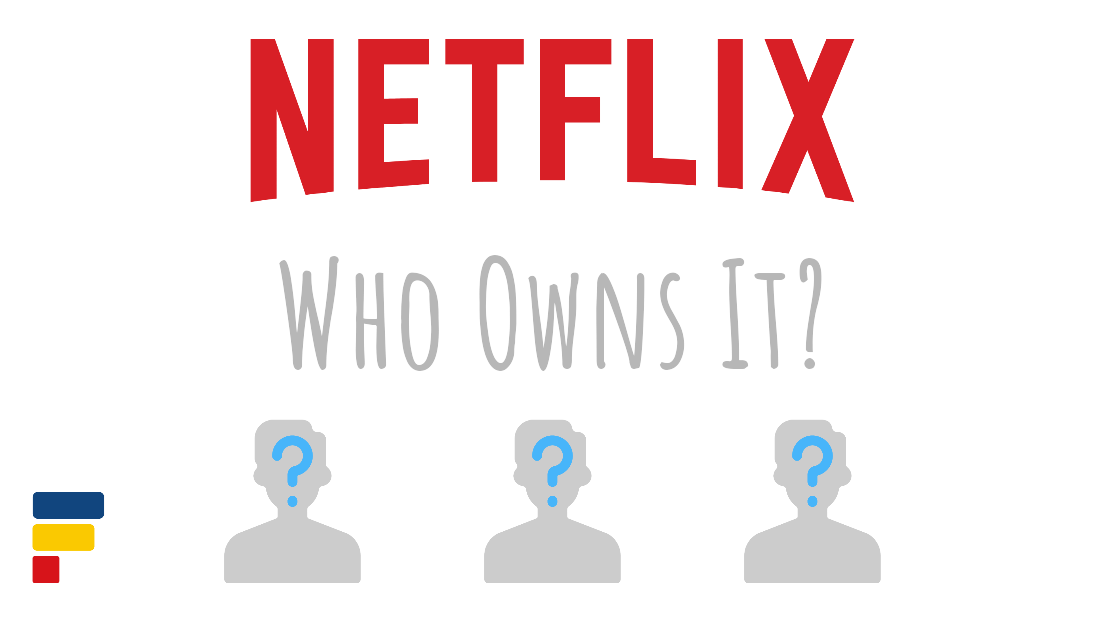Who Owns Netflix: The Largest Shareholders Overview

Netflix, Inc. (NFLX) is a subscription-based streaming service and production company. Netflix makes money by providing its own and third-party content to its customers for a monthly fee. Let’s look at who owns Netflix and who controls the company.
Netflix’s largest shareholders are asset managers Vanguard, which owns an 8.0% share, BlackRock (6.2%), and Fidelity (5.3%). A notable shareholder is also co-founder and chairman Reed Hastings, who owns 1.2% of Netflix.
|
|
|||
| Shareholder | Ownership | Voting Power | |
|---|---|---|---|
| Vanguard | 8.0% | 8.0% | |
| BlackRock | 6.2% | 6.2% | |
| Fidelity | 5.3% | 5.3% | |
| Reed Hastings | 1.2% | 1.2% | |
| Other | 79.3% | 79.3% | |
| Listed are shareholders holding >5% of any share class or notable in other ways | |||
 Source: Multiple SEC filings Source: Multiple SEC filings |
|||

In this article, I will dive more into who owns Netflix and who controls it. I will show you who Netflix’s largest shareholders are, how many shares and votes they have, and how much their stake is worth.
If you are interested, you can also explore who owns other companies like Amazon, Twitter, Apple, Roblox, or Spotify.
📃 Who Owns Netflix?

Netflix is owned by its shareholders. The largest ones are asset management giant Vanguard, which owns 8.0% of the company, followed by BlackRock, with a 6.2% ownership share, and Fidelity, with a 5.3% ownership. Co-founder and chairman Reed Hastings owns 1.2% of Netflix.
No shareholder has a dominant stake in the company. Netflix’s largest shareholders are asset managers who invest other people’s money. It is hardly a surprise since those companies are the largest asset managers worldwide and are often the top shareholders in larger public companies.
A sizable owner is also founder and chairman Reed Hastings, who owns 5.3% of Netflix.
Netflix was founded in 1997 by Reed Hastings and Marc Randolph. Netflix, Inc. has been a publicly listed company since its initial public offering on Nasdaq in 2002 (Ticker: NFLX)
Reed Hastings’s stake in Netflix after its IPO in 1997 was 15%, which through the years, decreased to the current ownership stake of 1.2%. Even this decreased ownership stake makes Hasting the largest known individual shareholder.
- Netflix co-founder Reed Hasting is still involved in the company as an executive chairman.
Co-founder Marc Randolph is no longer actively involved in Netflix and probably sold most of his stake after he left the company in 2002, shortly after Netflix’s IPO.
- His stake in Netflix after the IPO was 5.5%, including some options.
Netflix, Inc. is incorporated in the State of Delaware, but its headquarters are in Los Gatos, California (US).
🎮 Who Controls Netflix (NFLX)?

Netflix’s shareholders with the largest voting power are Vanguard, which holds 8.0% of all votes, followed by BlackRock (6.2%) and Fidelity (5.3%).
Netflix has only one class of outstanding shares, with one vote per share. Therefore, there is no difference between the shareholder’s ownership and voting power.
Ownership of Netflix, Inc. is quite dispersed, and the main shareholders are asset managers investing money on behalf of their clients.
None of them control the company individually, but together they have a big influence. Vanguard, BlackRock, and Fidelity together control 19.5% of all votes.
Netflix’s dispersed ownership might create conflicts of interest between Netflix’s management and its investors, which are represented by another management layer in the form of asset managers. In situations like these, insiders of the large asset manager shareholders and insiders of the company hold significant power over it.
The power of asset managers is amplified by several rules in Netflix’s bylaws that make it difficult to easily replace the board, and as a result it makes it difficult to pursue a hostile takeover of the company.
- 2/3 majority is required to elect directors
- Netflix has a classified board system where directors are split into three groups (classes), and each ear, only one group is up for reelection for a three-year term.
- No director can be removed without cause. End even if it is for cause, confirmation is needed from 2/3 majority of shareholders.
- A 2/3 majority is also required to change the rules around board elections.
- A similar classified board system is used, for example, by Tesla for its board.
Netflix ‘s insiders that have influence over the company are mainly co-CEO Ted Sarandos, co-CEO Greg Peters, chairman Reed Hastings and other board members and executives.
- Netflix currently has a 12-member board of directors.
- Nobody from the board of directors or executive officers except Hastings holds more than 0.05% share of Netflix ‘s stocks.
- Member of the board is also Brad Smith, vice chairman and president of Microsoft.
🗳️ Breakdown of Netflix’s Outstanding Shares and Votes by Top Shareholders
Netflix, Inc. had a total of 445 million outstanding shares as of December 2022. The following table shows how many shares each Netflix’s large shareholder holds.
|
|
||||
| In millions of shares as of December 2022 | ||||
| Shareholder | Class A | Total | % Share | |
|---|---|---|---|---|
| Vanguard | 36 | 36 | 8.0% | |
| BlackRock | 28 | 28 | 6.2% | |
| Fidelity | 24 | 24 | 5.3% | |
| Reed Hastings | 5 | 5 | 1.2% | |
| Other | 353 | 353 | 79.3% | |
| Total (# millions) | 445 | 445 | 100.0% | |
| Listed are shareholders holding >5% of any share class or notable in other ways | ||||
 Source: Multiple SEC filings Source: Multiple SEC filings |
||||
There were 445 million votes distributed among shareholders of Netflix, Inc.. The table below shows the total number of votes for each large shareholder.
|
|
||||
| In millions of votes as of December 2022 | ||||
| Shareholder | Class A | Total | % Share | |
|---|---|---|---|---|
| Vanguard | 36 | 36 | 8.0% | |
| BlackRock | 28 | 28 | 6.2% | |
| Fidelity | 24 | 24 | 5.3% | |
| Reed Hastings | 5 | 5 | 1.2% | |
| Other | 353 | 353 | 79.3% | |
| Total (# millions) | 445 | 445 | 100.0% | |
| Listed are shareholders holding >5% of any share class or notable in other ways | ||||
 Source: Multiple SEC filings Source: Multiple SEC filings |
||||
💵 Breakdown of Netflix’s Market Value by Shareholder
The following table summarizes how much is each shareholder’s stake in Netflix, Inc. worth.
However, keep in mind that a stake in Netflix could be just one part of their portfolio, and their total worth could be bigger, thanks to other investments. It could also be lower if they have debts.
|
|
||||
| Market value in billions $ as of December 2022 | ||||
| Shareholder | Class A | Total | % Share | |
|---|---|---|---|---|
| Vanguard | $10.5 | $10.5 | 8.0% | |
| BlackRock | $8.2 | $8.2 | 6.2% | |
| Fidelity | $7.0 | $7.0 | 5.3% | |
| Reed Hastings | $1.5 | $1.5 | 1.2% | |
| Other | $104.1 | $104.1 | 79.3% | |
| Total ($ billions) | $131.3 | $131.3 | 100.0% | |
| Listed are shareholders holding >5% of any share class or notable in other ways | ||||
 Source: Multiple SEC filings Source: Multiple SEC filings |
||||
Let’s now look at each Netflix shareholder individually.
📒 Who Are Netflix’s Largest Shareholders?
Let’s now go through the list of the largest shareholders of Netflix, Inc. one by one and look at who they are, how many shares they own, what is their voting power, and how much is their stake in Netflix worth.
#1 Vanguard (8.0%)

Vanguard is the largest shareholder of Netflix, owning 8.0% of its shares. As of December 2022, the market value of Vanguard’s stake in Netflix was $10.5 billion.
Vanguard owned 36 million shares in Netflix and controlled 36 million shareholder votes as of December 2022.
Vanguard (The Vanguard Group) is one of the largest asset managers in the world. It manages other people’s money through its mutual funds and exchange-traded funds and also offers other related investing and financial planning services.
Vanguard differs from other large asset managers by having no actual “owner .” Officially Vanguard says that its investors own it since its funds own it, and Vanguard fund investors own those funds.
However, the actual decision power is in the hands of Vanguard’s insiders since the ownership is diluted over millions of investors worldwide.
Vanguard has significant influence over the largest public companies. Thanks to its size, Vanguard usually belongs to the largest shareholders in those companies and has considerable power at their shareholder meetings. This is especially true if ownership is diluted.
- Several terms were coined to describe this issue. Some call it asset manager capitalism, and popular is also the power of twelve. Financial Times even put together who exactly those twelve people might be.
- Evidence shows that big asset managers usually vote together with management.
#2 BlackRock (6.2%)

BlackRock is the second-largest shareholder of Netflix, owning 6.2% of its shares. As of December 2022, the market value of BlackRock’s stake in Netflix was $8.2 billion.
BlackRock owned 28 million shares in Netflix and controlled 28 million shareholder votes as of December 2022.
BlackRock, Inc. is the world’s largest asset manager, with assets under management of $10 trillion. BlackRock is not only an asset manager, but it also provides other asset managers and corporations with its Aladdin portfolio management software.
BlackRock is a publicly traded company, and its largest shareholders are its competitors, including BlackRock itself. Not directly but through their passive and active funds. The largest shareholder is Vanguard.
A similar situation is also true in the opposite direction because BlackRock is a significant shareholder in many of its publicly traded competitors and other large institutions, making the whole thing even more eyebrow-raising.
This circular ownership between Vanguard, BlackRock, and other large asset managers, amplifies the issue often raised about the power of these large asset managers over public companies since they usually belong to the most significant shareholders with large voting power.
-
In the case of Blackrock, this influence is personified in the form of its CEO Larry Fink, who is a powerful figure with close ties to the FED and US government.
-
Adding to these concerns is evidence that BlackRock and other asset managers usually vote in favor of management proposals.
#3 Fidelity (5.3%)

Fidelity is the third-largest shareholder of Netflix, owning 5.3% of its shares. As of December 2022, the market value of Fidelity’s stake in Netflix was $7.0 billion.
Fidelity owned 24 million shares in Netflix and controlled 24 million shareholder votes as of December 2022.
Fidelity (FMR LLC) is one of the four largest asset managers in the world, together with BlackRock, Vanguard, and State Street. Fidelity is controlled by the Jonhson family, holding 49% of the voting power.
Fidelity is currently managed by Abigail Johnson after her father, Edward Johnson III, died in 2022.
An interesting fact is that in 2004 Abigail pulled a pretty bold move on her further when she tried to oust him from the company. The attempt was unsuccessful then, but she holds the reins now.
Like other large asset managers, Fidelity is not free from potential conflicts of interest.
#4 Reed Hastings (1.2%)

Reed Hastings owns 1.2% of Netflix’s shares. As of December 2022, the market value of Reed Hastings’s stake in Netflix was $1.5 billion.
Reed Hastings owned 5 million shares in Netflix and controlled 5 million shareholder votes as of December 2022.
Reed Hasting is co-founder of Netflix, its chairman and former co-CEO.
He studied computer science at Standford and, after that, worked as a software engineer.
He founded Pure Software, his first startup in 1991. Pure Software was later acquired multiple times. Hasting cashed out in 1997 to fund his next startup, Netflix.
Netflix was founded in 1997 by Hastings and Marc Randolph, and Hastings is still actively involved in the company.
❔ Does Netflix Co-founder Marc Randolph Still Own Netflix?
Reed Hastings and Marc Randolph co-founded Netflix in 1997, and while Reed Hasting’s face is closely connected with Netflix as its former CEO and co-CEO, only a few people know who Marc Randolph is.
Marc Randolph is Netflix’s co-founder and also its first CEO. However, he later passed the CEO reins to Hastings in 1999 and turned to product development.
Marc Randolph was still working at Netflix when it went public in 2002, and his official title was “Vice President of New Markets.”
He left soon after the IPO, and based on his memoirs, he has likely sold most of the 4% stake he held after the IPO soon after he left.
🧱 Who and When Founded Netflix?
Netflix was founded in 1997 by Reed Hastings and Marc Randolph and launched in 1998.
Netflix’s original business model was subscription based mail-order DVD rental. It was unique at the time that for a monthly subscription, customers could borrow a DVD for as long as they liked without late fees.
- After the customer mailed it back, they would receive the next DVD by mail from the list the customer put together.
Netflix was also very innovative in the way that its machine learning-based recommendation engine nudged people to which DVDs to borrow next.
At the time of its initial public offering (IPO), Netflix was still a DVD-rental business, although innovative.
In 2007, Netflix introduced streaming, and it very slowly gained dominance.
Now, Netflix still operates a DVD-rental service in the US, but it constitutes less than 1% of its revenue. Its main business, however, is subscription-based streaming of movies and TV shows, including the production of its own content.
Netflix founders’ ownership stakes at the time of the IPO were as follows:
- Reed Hastings had a 20.0% ownership stake before the IPO, diluted to 14.8% after, including options.
- Marc Randolph had a 5.5 % ownership stake, diluted to 4% after, including options.
📅 Netflix’s History Timeline
These are selected events from Netflix’s history:
- 1997: Netflix was founded by Reed Hastings and Marc Randolph as an order-by-mail service.
- 2002: Netflix’s initial public offering (IPO)
- 2007: Netflix launched a streaming service
- 2012: Netflix started making original shows. The first one was Lilyhammer, followed by House of Cards in 2013.
📚 Recommended Articles & Other Resources
Who Owns Apple: The Largest Shareholders Overview
Overview of who owns Apple and who controls it. With a list of the largest shareholders and how much is each of their stake worth.
Who Owns Twitter: The Largest Shareholders Overview
Overview of who owns Twitter and who controls it. With a list of the largest shareholders and how much is each of their stake worth.
Who Owns Amazon: The Largest Shareholders Overview
Overview of who owns Amazon.com, Inc. and who controls it. With a list of the largest shareholders and how much is each of their stake worth.
Who Owns Spotify: The Largest Shareholders Overview
Overview of who owns Spotify and who controls it. With a list of the largest shareholders and how much is each of their stake worth.
Who Owns Starbucks: The Largest Shareholders Overview
Overview of who owns the Starbucks Corporation and who controls it. With a list of the largest shareholders and how much is each of their stake worth.
Who Owns Zoom: The Largest Shareholders Overview
Overview of who owns Zoom Video Communications, Inc. and who controls it. With a list of the largest shareholders and how much is each of their stake worth
Other Resources
- Netflix’s Annual Financials Statements (K-10)
- Netflix’s Proxy Statement
- Netflix’s Certificate of Incorporation
Disclaimer: Although I use third-party trademarks and logos in this article and its visuals, kamilfranek.com is an independent site, and there is no relationship, sponsorship, or endorsement between this site and the owners of those trademarks.

